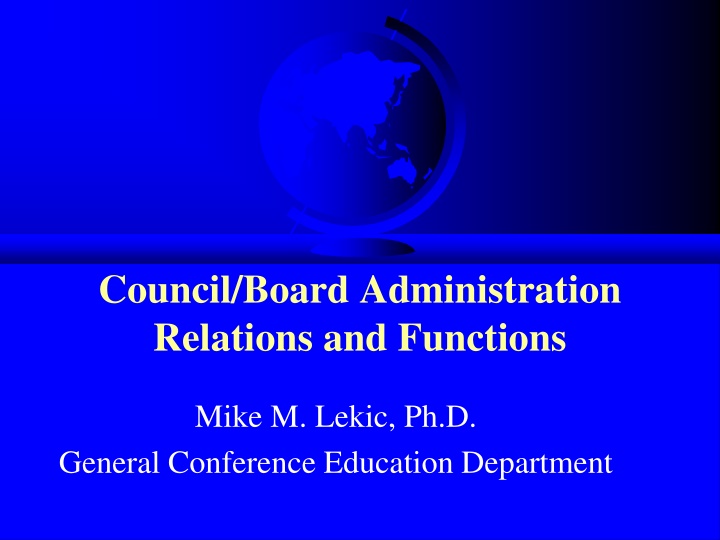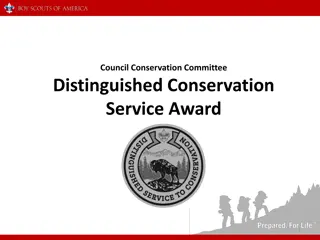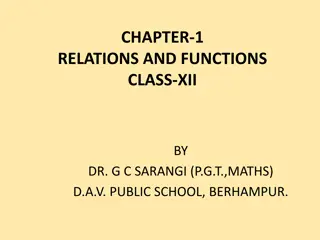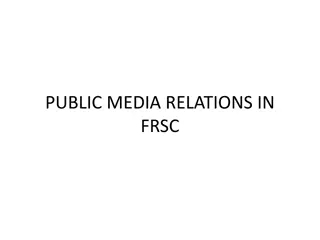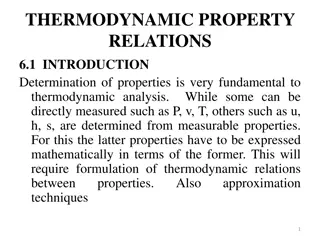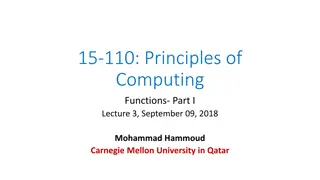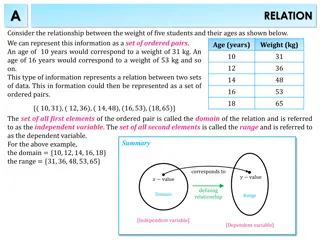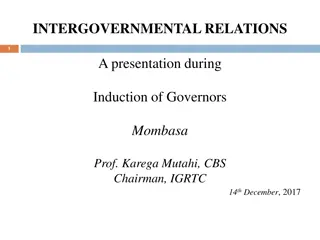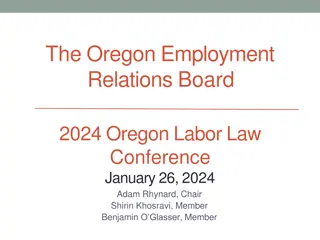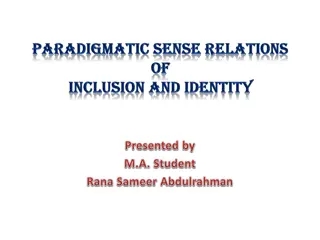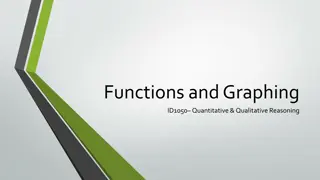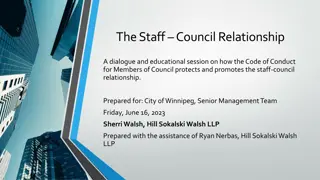Council/Board Administration Relations and Functions
Duties and responsibilities of governing boards in educational institutions involve refining mission, appointing leadership, guiding policies, ensuring financial solvency, and upholding institutional reputation. Best practices highlight the importance of vision, resource allocation, accountability, and advocacy for school success.
Uploaded on Feb 15, 2025 | 0 Views
Download Presentation

Please find below an Image/Link to download the presentation.
The content on the website is provided AS IS for your information and personal use only. It may not be sold, licensed, or shared on other websites without obtaining consent from the author.If you encounter any issues during the download, it is possible that the publisher has removed the file from their server.
You are allowed to download the files provided on this website for personal or commercial use, subject to the condition that they are used lawfully. All files are the property of their respective owners.
The content on the website is provided AS IS for your information and personal use only. It may not be sold, licensed, or shared on other websites without obtaining consent from the author.
E N D
Presentation Transcript
Council/Board Administration Relations and Functions Mike M. Lekic, Ph.D. General Conference Education Department
Governance - Leadership To lead means to go, travel, or guide. It implies movement, a venture into unexplored territory with unfamiliar destinations. A leader influences the direction and actions of a group of people Strategy/Vision. Where there is no vision, the people perish (Prov. 29:18).
Governance - Leadership The main duties of the governing board/council of an educational institution can be summarized as follows: 1. To refine, clarify, and define the mission of the school. 2. To select and appoint the principal/president and his or her associates in administration. 3. To provide guidance, counsel, and support to the principal/president. 4. To approve policies for the operation of the institution. 5. To approve institutional long-range plans and their timely implementation. 6. To approve or discontinue educational programs, as recommended by the administration.
Governance - Leadership 7. To select, upon recommendation of the administration, new faculty and support staff. 8. To ensure the financial solvency of the institution, approving and monitoring its budget. 9. To protect and enhance the good name of the institution. 10. To interpret for the school administration the needs and expectations of the constituency. 11. To serve as the court of final appeal in institutional matters. 12. To regularly assess its own performance. (Humberto Rasi Former GC Education Director)
Governance - Leadership Best-practices research and the literature agree that successful boards/councils perform several critical roles: (1) they must establish vision, (2) find resources to support that vision, (3) value accountability as they assess progress toward their vision, and (4) be a credible advocate for the schools they serve.
Administration - Management The root of the word manage is a word meaning hand. As James Kouzes points out, managing is about handling crises, maintaining order, keeping things organized and in control. By handling activities or things, one brings things about; he or she is in charge of or responsible for the completion of an activity.
Administration - Management School boards/councils expect tasks completed on time and on budget. These are management tasks. Constituents expect predictability and order. But they also expect the president and board to establish direction and to align people with the vision of the school. These are leadership tasks. Leaders motivate, inspire, and energize people.
Governance and Administration In many countries, governance is confused with administration. Many people who are invited to join a school/college/university board/council have firm conviction that their primary responsibility is to administer.
Board Member Orientation It is extremely important for all board members to receive adequate orientation (education), regarding the role of the trustee. When members of a governing board are unclear about their responsibilities, their functions, the built up frustration can cause them to loose interest and commitment to the task.
Purpose of Boards/Councils So. What is the purpose of the governing board of an Adventist school/college/university? Is it to manage the institution or to affirm the management decisions of the administration?
Purpose of Boards/Councils Boards can effectively serve three major functions: (1) policy making and enforcement; (2) oversight of school/college/university operations; and (3) cheerleading for the institution. Policy is nothing more than a statement of intentions about the major operating goals of the institution ranging from building projects to spiritual life.
Purpose of Boards/Councils One such goal might be to operate within a balanced budget. A wise principal, college/university president/vice chancellor/rector will do his or her best to function within the policies set by the board.
Purpose of Boards/Councils An effective school/college/university board or council is knowledgeable about the institution s operations to ensure that board decisions are being implemented and that the policies are accomplishing their intended purpose.
Purpose of Boards/Councils The board/council should be proud of the school/college/university and the mission it carries out on behalf of the church. Individual board members should speak out publicly in support of the school (cheerlead) and should help recruit students. If they do not feel comfortable in this role, they will probably not be effective members of the board.
The Administrations Role A successful principal, vice chancellor/president or administration develops positive relationship with the board and its individual members by keeping them informed about school operations and more specifically, how board policies are being implemented. The principal also plays a leadership role by recommending possible policy changes to the board.
The Administrations Role The principal/president/vice chancellor/ rector has two major functions in relation to the board/council. First, to manage the school well within the policies of the board. When a school is poorly managed, the board and its individual members are tempted to involve themselves in its daily operations.
The Administrations Role Second, the principal, president, vice chancellor, rector also has a leadership role with the board. He or she should not only provide the information needed for the board to carry out its oversight function, but also inform the board about the effectiveness of its policies. This means proposing new policy or modifications to existing policies if they are not working well.
Governance and Administration Dealing with the school/college/university board is a major function of the school/college/university administration, but how to do so effectively is seldom taught in education courses. The research related to the effectiveness of boards, as well as administrators methods of dealing with them is also limited.
Effective Boards/Councils In sum, the following four roles are generally accepted as essential for effective boards/councils Establish a vision (mission) Establish and maintain an organizational structure that supports the vision. Assess progress and ensure accountability to the constituency. Be an advocate for students and Adventist education.
Board/Council Member Mission Board members are entrusted with the mission and the delivery of Adventist Education. They must be guardians, dreamers, salesmen, recruiters, encouragers, marketers, innovators, and Christian professionals.
Boards/Councils Should Avoid Extremes The boards/councils should avoid the extremes of appearing too strong and thus becoming a watchdog, or being too weak, and thus becoming irrelevant.
Successful Boards/Councils Best practices, research, and the literature agree that successful boards perform several critical roles: They must establish a vision, find resources to support that vision, value accountability as they assess progress toward their vision, and be a credible advocate for the school they serve.
Effective Leader An effective leader needs vision, the ability to motivate people, empathy, the willingness to listen, a strong moral compass, the ability to collaborate to achieve shared goals, and the determination to earn the respect of the team.
Board/Council Service Not Always Easy Board/Conmcil Service can be both frustrating and rewarding. Frustrating for the long, unpaid hours searching for solutions.
Rewarding Because Of--- The satisfaction of watching students grow. Rejoicing in their achievements. Satisfaction knowing that you have been a part of making it happen.
Keys for a Successful Meeting Start on time End on time Move through the agenda efficiently Be a good listener Don t criticize the speaker - disagree with ideas. Remember that the walls have ears
Discussion Question Whenever there is discussion on a motion, two or three individuals dominate the conversation. What should the chair do? Review parliamentary procedures with the entire board Talk with them privately to ask for their cooperation Become more assertive Possibly, all of the above
Discussion Question You have had executive sessions the last two board meetings. Three days after each meeting someone not on the board has called you to talk about something discussed during the session. The information they volunteer is accurate. What should you do??
What To Do? To the caller: Listen, but don t say anything. Do not verify or deny the information. Inform the caller that the information in executive session is confidential, therefore, he/she should not know about the matter and you are not free to discuss it with him/her. To the board/council: Handle the matter privately if possible. Otherwise, discuss the breach of ethical principle in board meeting. Board members should be reminded that they could be personally liable for revealing confidential information outside the board room.
Discussion Question Which of the following leadership styles would you like to be exhibited in board/council meetings?
Authoritarian Style Leader dominates the discussion Gives orders as if the boss Makes many personal remarks Often tells the board what they ought to do
Democratic Style Encourages discussion from all of the members Suggests alternatives to consider Encourages consensus within the group Moves the group toward a final decision
Laissez Faire Style Minimal participation with others often taking over the meeting No suggestions for alternatives Usually does not use parliamentary procedures
Which Style is Desirable? Authoritarian Democratic Laissez Faire
Suggestions for Conflict Avoidance School/College/University Board/Council meetings have the potential for being places where people often disagree. To help yours go smoothly, the following suggestions by Attorney-Mediator Peter S. Chantilly's might be helpful.
Conflict Avoidance Learn to disagree without being disagreeable. It s alright to be assertive, but not aggressive, abusive, or abrasive. When someone says something with which you disagree, try not to be judgmental.
Conflict Avoidance (continued) Be kind and courteous to everyone. Remember that civility is a sign of strength, not weakness. Speak in normal tones (people tune out loud, angry voices.)
Conflict Avoidance (continued) Your attitude is more important than your aptitude. Mutual Respect is the key to avoiding conflict. Give the other person a chance to be heard without interrupting. .and lastly
The Shortest Distance Between Two People is a ---SMILE!
Our Standard Something better is the watchword of education, the law of all true living. Lead them (the students) to behold the One altogether lovely. Education, pages 296, 297
